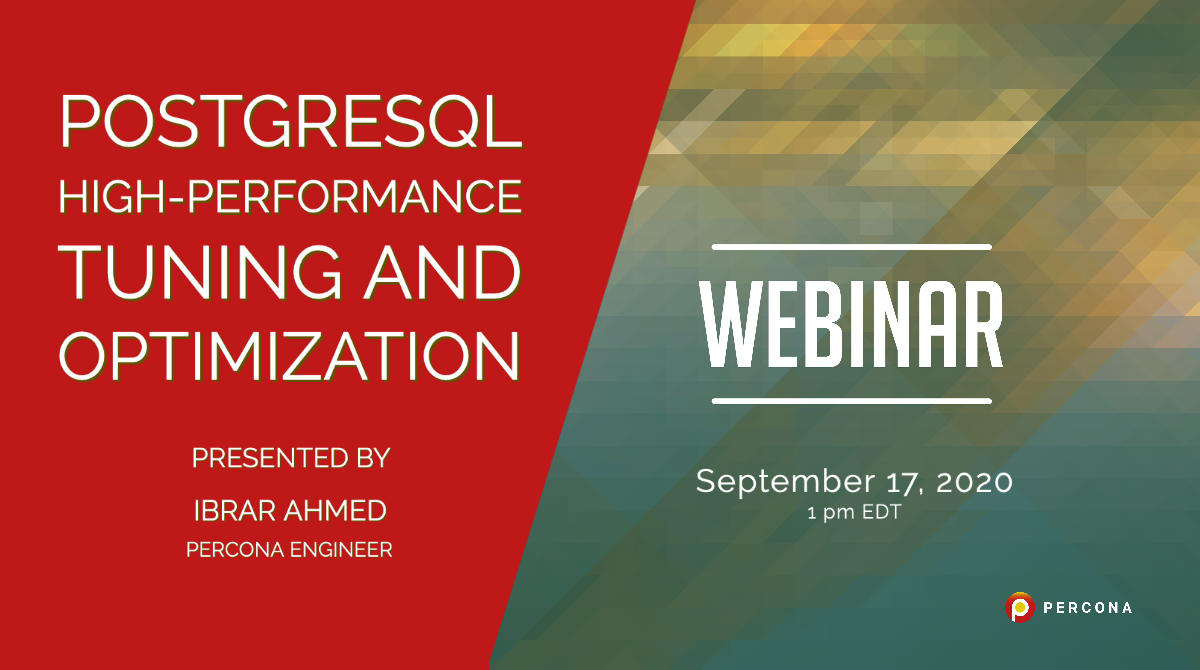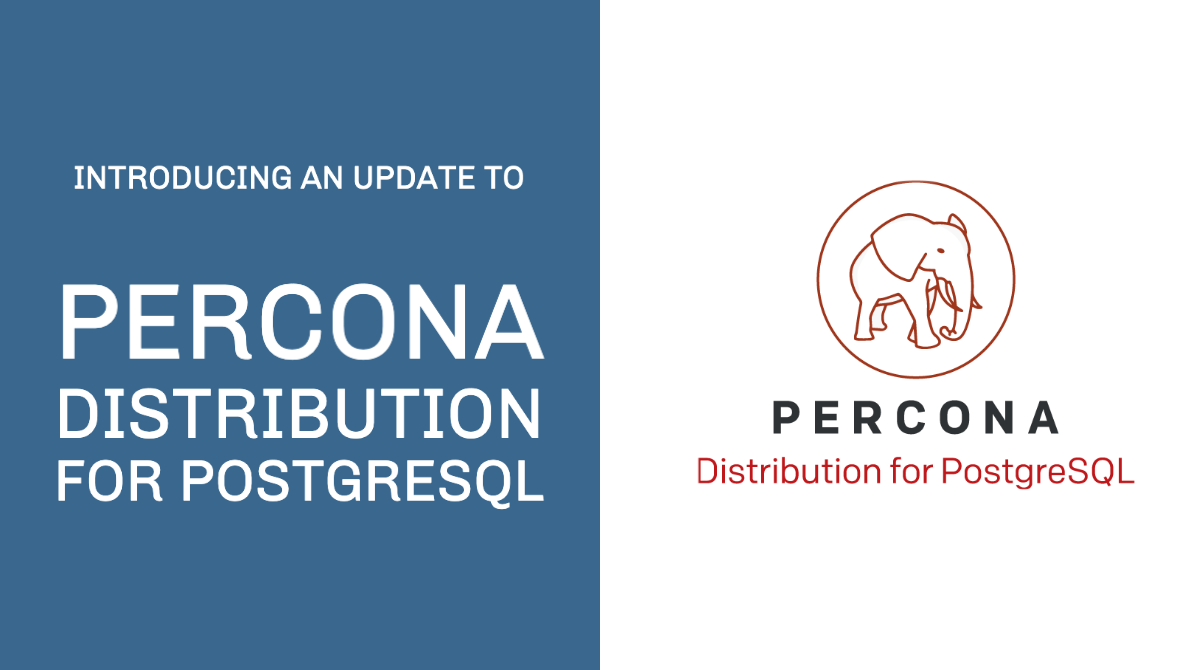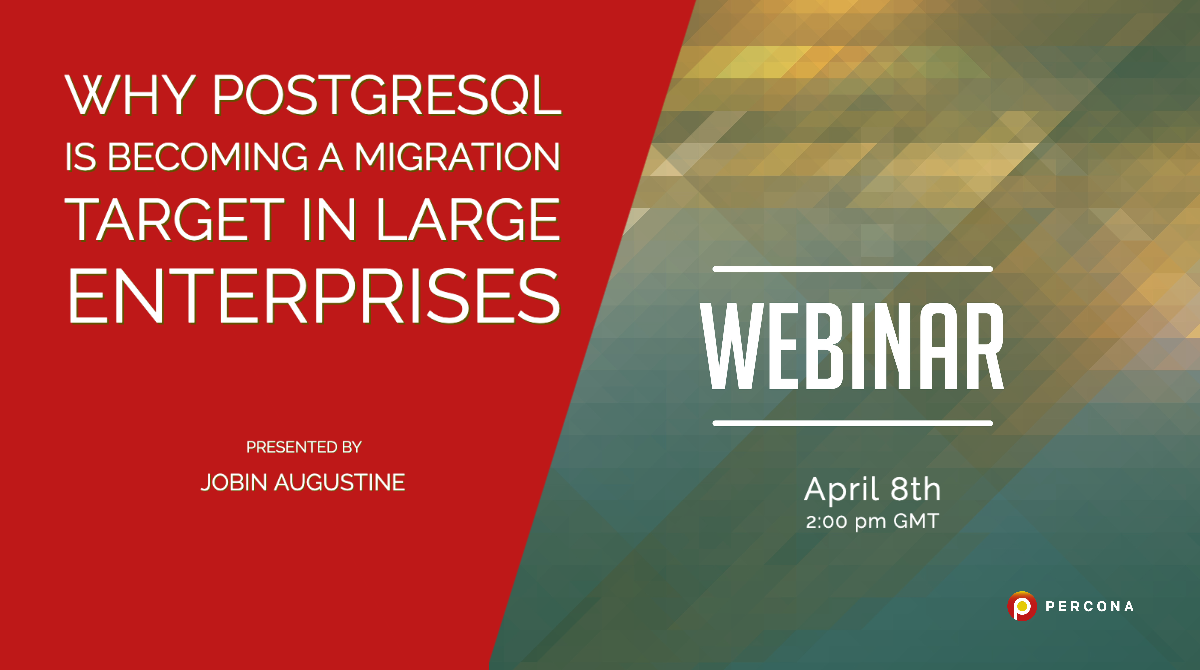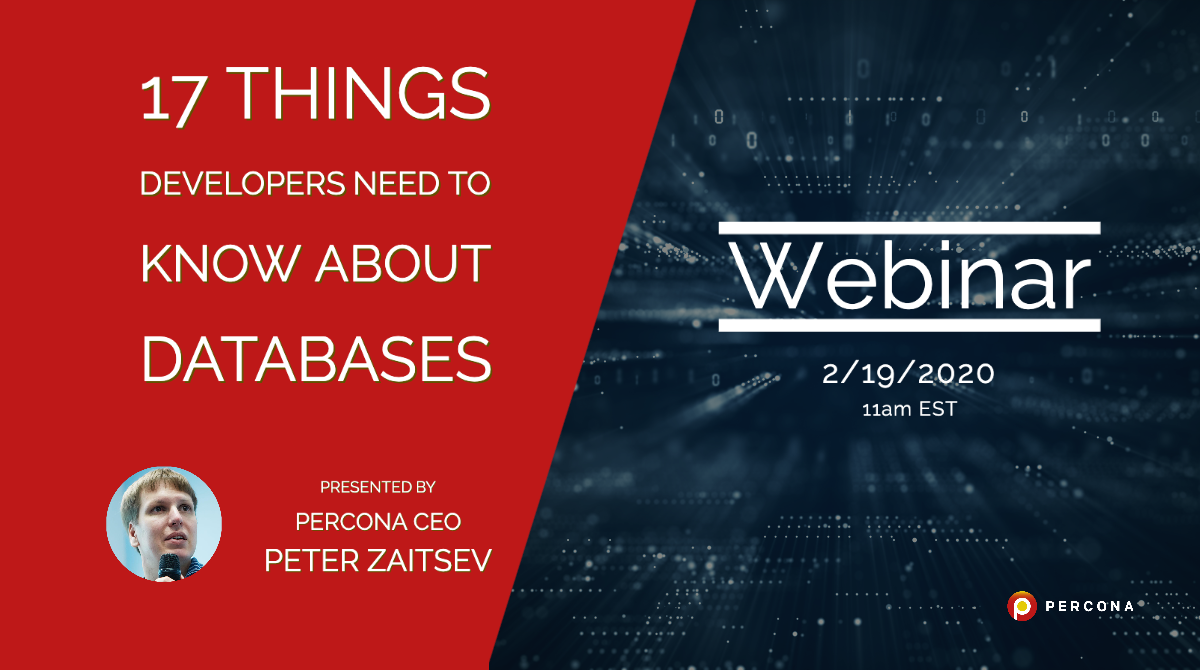
by David Quilty | Sep 3, 2020 | PostgreSQL, Webinars
Please watch Percona’s Senior Software Engineer Ibrar Ahmed as he presents the “PostgreSQL High-Performance Tuning and Optimization” webinar. PostgreSQL is one of the leading open-source databases. Out of the box, the default PostgreSQL configuration is not...

by Jobin Augustine | Aug 21, 2020 | Insight for DBAs, PostgreSQL
I find myself discussing and explaining sychronous_commit with many PostgreSQL users, especially with novice users. So, I thought of noting down all the key points as a blog post which will be useful for more users. Recently I got an opportunity to talk about some...

by Valentina Lago | Aug 6, 2020 | MongoDB, MySQL, Percona Events, PostgreSQL
In the lead up to Percona Live Online, we are excited to introduce Percona Tech Days! Percona Tech Days are free, half-day events dedicated to the most popular open source database technologies: MySQL, MongoDB, and PostgreSQL. Each day, we’ll be focusing on one...

by Ibrar Ahmed | Jul 28, 2020 | Insight for DBAs, Insight for Developers, PostgreSQL
The PostgreSQL 13 Beta is out in the testing phase with a rich feature set. It is a very good learning effort to participate in the testing of one of the finest databases in the world. It does not matter how much development, coding, and administration experience you...

by Vadim Tkachenko | Jul 28, 2020 | Benchmarks, Insight for DBAs, Insight for Developers, PostgreSQL
Continuing with the checkpointing topic I started a month ago with my blog post MongoDB Checkpointing Woes, this time I want to review how PostgreSQL performs in this area. After this, I will be taking a look at MySQL and MariaDB. If anything, it will be fair not only...
by David Quilty | Jul 16, 2020 | PostgreSQL, Webinars
Join Ibrar Ahmed, Sr. Software Engineer, Percona, as he discusses the concept of multi-primary replication and elaborates on the well-known multi-primary replication available. Scalability can be achieved horizontally or vertically. Vertical scalability means adding...

by Ibrar Ahmed | Jun 9, 2020 | Insight for DBAs, PostgreSQL
Due to the immense generation of data, scalability has become one of the hottest topics in the field of databases. Scalability can be achieved horizontally or vertically. Vertical scalability means adding more resources/hardware to existing nodes to enhance the...

by Robert Bernier | May 29, 2020 | Insight for DBAs, PostgreSQL
Taking our cue from Peter Zaitsev’s article on MySQL Performance Bottlenecks, I’m going to talk a little about the PostgreSQL perspective of removing bottlenecks caused by high traffic. Many stacks these days are implemented by trusting the Object...

by Jobin Augustine | May 21, 2020 | Insight for DBAs, Insight for Developers, PostgreSQL
Missing Piece: Failover of the Logical Replication Slot Logical decoding capability has existed in PostgreSQL for the last several versions, and a lot more functionalities are added over time. However, one of the very crucial functionalities is still missing in...

by Rick Golba | May 19, 2020 | Percona Software, PostgreSQL
Percona is pleased to announce the release of an updated version of Percona Distribution for PostgreSQL. Following on our initial PostgreSQL Distribution, released in September 2019, this update incorporates the new features of PostgreSQL 12.2 Core Distribution...

by Jobin Augustine | Apr 16, 2020 | Insight for DBAs, Insight for Developers, PostgreSQL
This is one of the most common questions asked by developers who write SQL queries against the PostgreSQL database. There are multiple ways in which a sub select or lookup can be framed in a SQL statement. PostgreSQL optimizer is very smart at optimizing queries, and...

by David Quilty | Apr 13, 2020 | PostgreSQL, Webinars
PostgreSQL Partitioning has evolved in different versions of PostgreSQL and now has solid scalability features. PostgreSQL has three different kinds of partitioning: Range, List, and Hash Partitioning. This webinar will cover the basics of all kinds of Partitioning...

by David Quilty | Mar 30, 2020 | PostgreSQL, Webinars
The adoption and market share of PostgreSQL is growing at a rapid rate. And it’s not just new installations or applications – there are huge levels of migrations happening from other database systems as well. In this webinar, we will discuss the reasons...

by Fernando Laudares Camargos | Mar 25, 2020 | Insight for DBAs, Percona Software, PostgreSQL
We recently helped migrate a production PostgreSQL database running on a given DBaaS platform… to another DBaaS platform. When it comes to vendor “lock-in”, some providers are easier (and even friendlier) to deal with than others, but it is never a...

by Vadim Yalovets | Mar 12, 2020 | Monitoring, Percona Software, PostgreSQL
This blog post is about how you can gain detailed information in Percona Monitoring and Management (PMM2) of PostgreSQL disk usage. We take a look at using a catalog called pg_class, which catalogs tables and most everything else that has columns or is otherwise...

by Jobin Augustine | Feb 13, 2020 | Insight for DBAs, PostgreSQL
As hardware and software evolve, the bottlenecks in a database system also shift. Many old problems might disappear and new types of problems pop-up. Old Limitations There were days when CPU and Memory was a limitation. More than a decade back, servers with 4 cores...

by David Quilty | Feb 7, 2020 | Insight for Developers, MongoDB, MySQL, PostgreSQL, Webinars
Most applications use databases, yet many fail to follow even the most basic best practices, resulting in poor performance, downtime, and security incidents. In this presentation, we will look into the foundational best practices you as a Developer should know about...

by Robert Bernier | Jan 21, 2020 | Insight for DBAs, Insight for Developers, PostgreSQL
Hello! My name is Robert and I am a PostgreSQL Consultant at Percona. I’ve been here since the summer of 2019 but things have been so busy that this is the first chance I’ve had to write. For my first blog, I’d like to write about … you. Or,...

by Jobin Augustine | Jan 17, 2020 | Insight for DBAs, PostgreSQL
Python 2 has officially completed its life as of Jan 1st, 2020 and the Python 2.x branch will not be maintained anymore. You might be seeing repeated notices of deprecation in log files and terminals like: Shell DEPRECATION: Python 2.7 will reach the end of its life...

by Jobin Augustine | Dec 3, 2019 | PostgreSQL
There is a less-talked-about improvement in PostgreSQL 12 which can greatly reduce the benign log entries. This patch is probably one of the smallest in PostgreSQL 12. The commit message says: Shell Don't log incomplete startup packet if it's empty This will stop...



















